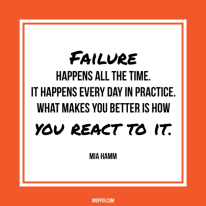
According to the New Media Consortium (NMC), wicked problems are, “issues that are extremely difficult and even seemingly impossible to solve because of the complex or ever-changing environment in which they arise” (p. 1). Through one of my graduate classes, I was asked to join a Think Tank, composed of a couple of classmates, to brainstorm ideas and strategies to solve one of the five “wicked problems” that was proposed in 2013 by the NMC. My team consists of Becky, Chelsea, and Taylor. We decided to take on the challenge of formulating a solution that would “allow failure to be as powerful a learning mode as success” (NMC, 2013, p. 1).
Failure for most people, including myself, is not an easy thing to accept. But, why? In her Ted Talk, On Being Wrong, Kathryn Schulz said there are a couple of reasons we get stuck inside the idea of “rightness.” First, she said that we enter an “error blindness” where we have no internal cue telling us we are wrong until it’s too late.” Second, and more alarming she said, “by the time we’re 9 years old, we think the people who get stuff wrong are lazy” and that, “the only way to succeed in life is to never make any mistakes” (Schulz, 2011). These are dangerous lessons for us to learn at such an early age, when they just aren’t true! Some of the greatest discoveries have resulted because of “accidents,” such as xrays, velcro, the pacemaker, and play-doh just to name a few (Biddle, 2010).
Our solution to this problem involves some shifts in pedagogy within the classroom. We believe that there is a connection between inquiry based learning, flipped learning, and standards based grading that can be used to help students explore success through failure. Gee (2013) stresses that, “…you have to persist past failure and sustain effort over many hours and years for areas you want to master (p. 203). He also explains that, “people need to learn in contexts where something is at stake for them, where what they are going to learn matters to them, and where they understand why it is important, worthwhile, and a valuable use of their time” (Gee, 2013, p. 209). Both of these ideas point towards an inquiry based learning approach because inquiry learning involves students often needing to develop persistence to push past problems they may face. Students are able to guide their own learning and find ways to make it relevant to them. In addition, standards based grading allows students to work at their own pace to show mastery of various concepts, once again allowing them to push past initial failure. Finally, flipped classrooms promote inquiry learning as the role of the teacher changes from directly instructing to facilitating learning.
However, because teachers are often resistant to changing their methodologies of teaching, we proposed that professional development directly modeling and allowing the teachers to participate in inquiry based learning would be required. DiBiase and McDonald (2015) found that, “research tells us teachers’ attitudes, values, beliefs, and practices can be changed through professional development” (p. 34).
Since my teammates and I do not live in the same cities, we have utilized various methods of communicating with one another. We had a Zoom meeting to discuss our main plan of action and to divide up our research. We have also written the draft of our proposal through using Google docs, Voxer, and texts.
To see more of the progress my team has made so far on our wicked problem proposal, check out our blendspace!
References:
Biddle, S. (2010, August 26). The 10 greatest (accidental) inventions of all time. Retrieved August 3, 2015, from http://www.nbcnews.com/id/38870091/ns/technology_and_science-innovation/t/greatest-accidental-inventions-all-time/#.Vb-VwOhViko
DiBiase, W., & McDonald, J. R. (2015). Science teacher attitudes toward inquiry-based teaching and learning. Clearing House: A Journal of Educational Strategies, Issues and Ideas, 88(2), 29-38. Retrieved from http://ezproxy.msu.edu/loginurl=http://search.proquest.com/docview/1697501965?accountid=12598
Gee, J. (2013). The Anti-Education ERA: Creating Smarter Students Through Digital Learning (First Ed.). New York, NY: Palgrave MacMillan.
New Media Consortium (2013). The Horizon Project. Retrieved from http://www.nmc.org/horizon-project
Schulz, K. (2011, March). Kathryn Schulz: “On Being Wrong” [Video file]. Retrieved from http://www.ted.com/talks/kathryn_schulz_on_being_wrong?language=en
Photo Taken From: https://www.flickr.com/photos/inspiyr/9673412120
Hi Rosie,
I hope you are enjoying your summer. It won’t be long before school starts up and we can put some of the great resources and strategies that we have learned from our summer classes into action.
I see that your think tank has really thought deeply about how you will tackle your wicked problem. Failure is regarded very negatively with people of all ages. You have some good sources to support and explain your wicked problem. The three areas of attack are quite important. Inquiry based learning is a great motivation to give students the freedom to explore specific content and possibly fail to then reexamine from another angle promoting successes through failure.
One thing that might add to this concept is the idea of having a failure wall. Just an area in the classroom were failure is documented and the next level of reasoning takes place. When students see progress of what the failure has resulted in they are more willing to take the risks. Little steps working to the higher level of acceptance of failure is part of the learning might drive that shift of acceptability in the classroom.
When your team looks at the pedagogy of a flipped classroom you may want to prepare yourselves for the critics that might argue it is just a shift in simply a high-tech version of an antiquated instructional method: the lecture. Another possible argument of the flipped classroom as I would find in the area I teach is that poor communities that do not have access to the resources this would widen the learning gap.
I think your team’s definitely on the right path. I am excited to see your final project. Good Luck!
LikeLike